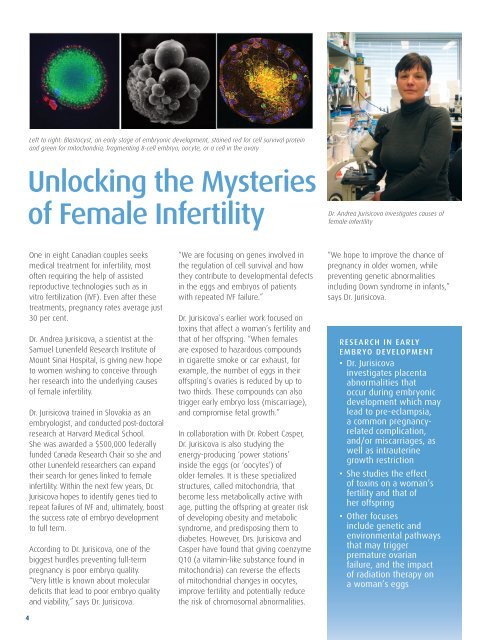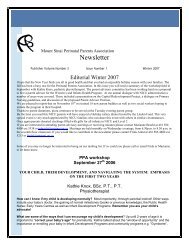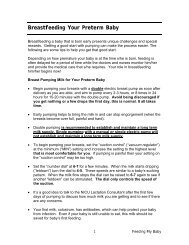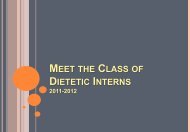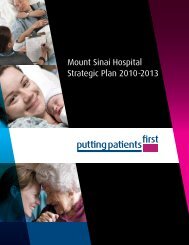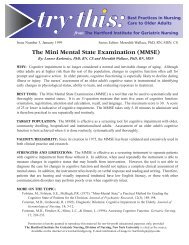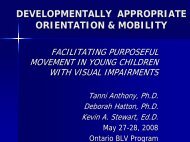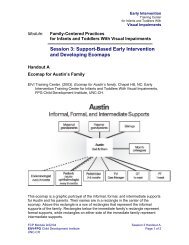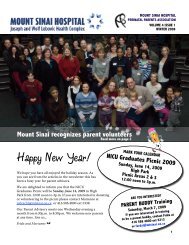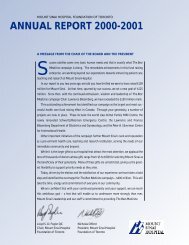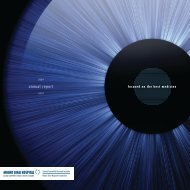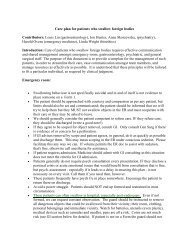Spring 2011 edition - Foundation
Spring 2011 edition - Foundation
Spring 2011 edition - Foundation
Create successful ePaper yourself
Turn your PDF publications into a flip-book with our unique Google optimized e-Paper software.
Left to right: Blastocyst, an early stage of embryonic development, stained red for cell survival protein<br />
and green for mitochondria; fragmenting 8-cell embryo; oocyte, or a cell in the ovary<br />
Unlocking the Mysteries<br />
of Female Infertility<br />
Dr. Andrea Jurisicova investigates causes of<br />
female infertility<br />
4<br />
One in eight Canadian couples seeks<br />
medical treatment for infertility, most<br />
often requiring the help of assisted<br />
reproductive technologies such as in<br />
vitro fertilization (IVF). Even after these<br />
treatments, pregnancy rates average just<br />
30 per cent.<br />
Dr. Andrea Jurisicova, a scientist at the<br />
Samuel Lunenfeld Research Institute of<br />
Mount Sinai Hospital, is giving new hope<br />
to women wishing to conceive through<br />
her research into the underlying causes<br />
of female infertility.<br />
Dr. Jurisicova trained in Slovakia as an<br />
embryologist, and conducted post-doctoral<br />
research at Harvard Medical School.<br />
She was awarded a $500,000 federally<br />
funded Canada Research Chair so she and<br />
other Lunenfeld researchers can expand<br />
their search for genes linked to female<br />
infertility. Within the next few years, Dr.<br />
Jurisicova hopes to identify genes tied to<br />
repeat failures of IVF and, ultimately, boost<br />
the success rate of embryo development<br />
to full term.<br />
According to Dr. Jurisicova, one of the<br />
biggest hurdles preventing full-term<br />
pregnancy is poor embryo quality.<br />
“Very little is known about molecular<br />
defi cits that lead to poor embryo quality<br />
and viability,” says Dr. Jurisicova.<br />
“We are focusing on genes involved in<br />
the regulation of cell survival and how<br />
they contribute to developmental defects<br />
in the eggs and embryos of patients<br />
with repeated IVF failure.”<br />
Dr. Jurisicova’s earlier work focused on<br />
toxins that affect a woman’s fertility and<br />
that of her offspring. “When females<br />
are exposed to hazardous compounds<br />
in cigarette smoke or car exhaust, for<br />
example, the number of eggs in their<br />
offspring’s ovaries is reduced by up to<br />
two thirds. These compounds can also<br />
trigger early embryo loss (miscarriage),<br />
and compromise fetal growth.”<br />
In collaboration with Dr. Robert Casper,<br />
Dr. Jurisicova is also studying the<br />
energy-producing ‘power stations’<br />
inside the eggs (or ‘oocytes’) of<br />
older females. It is these specialized<br />
structures, called mitochondria, that<br />
become less metabolically active with<br />
age, putting the offspring at greater risk<br />
of developing obesity and metabolic<br />
syndrome, and predisposing them to<br />
diabetes. However, Drs. Jurisicova and<br />
Casper have found that giving coenzyme<br />
Q10 (a vitamin-like substance found in<br />
mitochondria) can reverse the effects<br />
of mitochondrial changes in oocytes,<br />
improve fertility and potentially reduce<br />
the risk of chromosomal abnormalities.<br />
“We hope to improve the chance of<br />
pregnancy in older women, while<br />
preventing genetic abnormalities<br />
including Down syndrome in infants,”<br />
says Dr. Jurisicova.<br />
RESEARCH IN EARLY<br />
EMBRYO DEVELOPMENT<br />
• Dr. Jurisicova<br />
investigates placenta<br />
abnormalities that<br />
occur during embryonic<br />
development which may<br />
lead to pre-eclampsia,<br />
a common pregnancyrelated<br />
complication,<br />
and/or miscarriages, as<br />
well as intrauterine<br />
growth restriction<br />
• she studies the effect<br />
of toxins on a woman’s<br />
fertility and that of<br />
her offspring<br />
• Other focuses<br />
include genetic and<br />
environmental pathways<br />
that may trigger<br />
premature ovarian<br />
failure, and the impact<br />
of radiation therapy on<br />
a woman’s eggs


